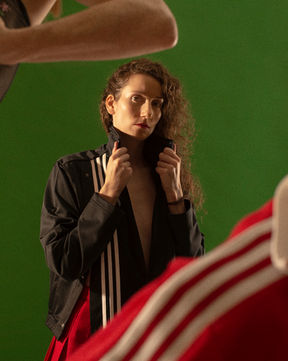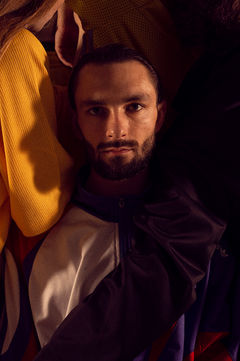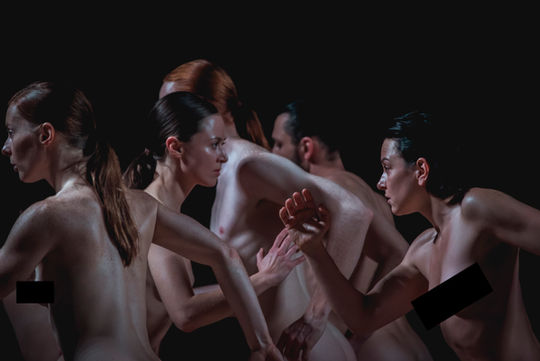
Concept and choreography:
Dominik Więcek
Creation and performance:
STICKY FINGERS CLUB collective consisting of: Daniela Komędera, Dominika Wiak, Dominik Więcek, Monika Witkowska as well as Natalia Dinges and Piotr Stanek
Dramaturgy:
Konrad Kurowski
Scenography:
Mateusz Mioduszewski
Costumes:
Weronika Wood
Music:
Przemek Degórski
Light design:
Piotr Pieczyński
Special thanks to people whose work was an inspiration for us: Paweł Wysocki, Johnny Blade, Biesiad Strong. And we are very grateful for the support of Lublin Dance Theater and the Cultural Center in Lublin.
GLORY GAME
The first modern Olympic Games coincide with the invention of the cinematograph, which completely transformed the way sports are participated in and received. The storytelling in the media starts influencing how sport competitions are set up. Rules and regulations of the Olympic fields are being changed under the gaze of the camera and the tele-participation of the spectator. Movements are being edited: slowed down and sped up, replayed in close-ups or expanded by multiple viewpoints. For the spectator, this distorted perception of the games becomes an immersive experience with elements of melodrama.
At the center of it all is the body, from which the rules of the game constantly demand more and more. Modern sports impose extreme loads on athletes that exceed the biological capacity of the body. Citus - altius - fortius (faster - higher - stronger).
"You say you want to win in Olympia. However, think through what this entails. You must be obedient, follow your diet, deny yourself cookies, exercise at set times, whether it's hot or cold. You are not allowed to drink cold water or wine when you want. You should put yourself in the hands of a trainer as if you were entrusting yourself to a doctor. And later, during the competition, it's your opponent who will try to blind you, and it's you who will dislocate your arm, and it's you who will twist your ankle, and it's you who will ingest sand and be flogged. And after all this, it may happen that you lose." (Epictetus. Discourses III.15.2-4)
In sports, it's always about doing something faster, higher, stronger, better. Competing and striving for perfection takes a lifetime, and rivals are just waiting for the slightest slip-up. Someone who was an ally can suddenly become an enemy. All for a few seconds of fame. Glory Game with choreography by Dominik Więcek is a phenomenal study of this case.
Glory Game is, above all, incredibly hypnotizing and it's about a perfect movement in almost stillness. The six performers move in slow motion throughout the performance. Completely naked, athletic bodies bring to mind the ancient Olympics. Despite the slow pace, the muscles are under tension accompanying the titanic work the body does while running. The competitors move on a square-shaped stage covered with sand, from right to left and back.
(...)
In Glory Game you can't take your eyes off the performers even for a second. Although the creators were inspired by athletes, we must not forget that male and female dancers often perform equally titanic work. They train hard, try new solutions, constantly work with their bodies and materials for subsequent performances, only to appear on stage with them a few times.
Kinga Senczyk / Review -> https://popkulturowcy.pl/2023/12/19/glory-game-recenzja-spektaklu/
Not a single word is uttered in the performance, the meanings and themes result from the movement (the choreographer is Więcek), the costume (Weronika Wood) and the set design (Mateusz Mioduszewski), and from the place, the former gymnasium at the primary school at Emilia Plater Street, the building where currently Komuna is located. The default paneling, ladders and basketball boards - it's all still there. What about invisible? This is less important - paradoxically, because Glory Game is a story about visibility. About the narrative of cameras and special effects that shape it. About everything that we are used to treating as the nature of sports broadcasting. Glory Game, after all, is about sports. It is about body discipline and effort, but also about brutal competition - not so much for records and medals, but for attention. The competition on the stage arena is, in fact, just another success story. Its desire and costs - in this sense, the new performance is a development of the two previous ones, especially the debut, in which the artists looked at failure, dissatisfaction and unfulfillment, as well as the poisonous pressure that lies in artistic competition. But Glory Game can also be read as a question: is success possible at all, and if so, what does it really mean? The costume of this story is sporty, because the performers also have experience practicing various disciplines, training and taking part in competitions; but today they are more concerned with artistic hierarchies, which still strongly determine the art market. That's right - the market. He was the one they looked at in the two previous projects. By asking questions about the possibility of a breach in the rules of the game. I don't see this question in Glory Game, which I read pessimistically. There is no point in repeating it because the answer is known and unchanging. Just like the rules.
"Przebój" by Dominik Gac for TEATR Magazine Magazynu Teatr.
Full article -> https://teatr-pismo.pl/22198-przeboj/?fbclid=IwAR2PQtOvMTSdxsAvVg0kxzR4uJF-vhWVMJNNerBm8N56VkwcsNErT6_OYno




































